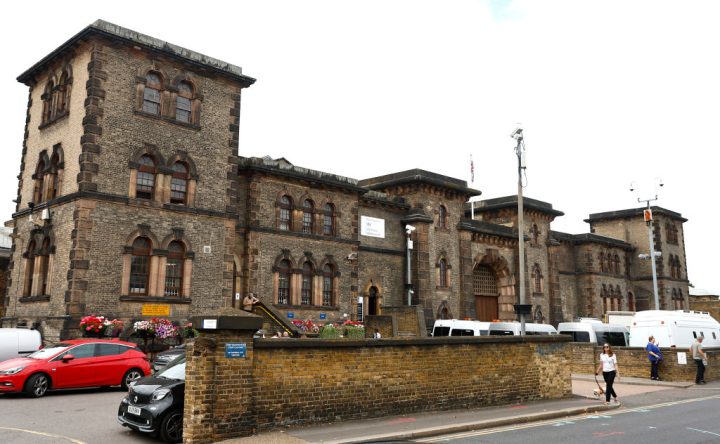Imagine the scene. It’s Friday morning and the new Secretary of State for Justice, Shabana Mahmood, has just slipped into the big chair. Her predecessor has left her a note on the desk, ‘I’m afraid there is no cell space. Kind regards – and good luck! Alex.’
With prison capacity running at 99 per cent and new jails still on the far horizon, the first priority of the new Lord Chancellor is to stop the criminal justice system grinding to a halt. Keir Starmer, aware that the shelf life of ‘inherited mess’ will be brutally short, has gone on TV to prepare public opinion for the emergency early release of prisoners to continue and go even further. The party’s tough on crime poetry pre-election will collide with the prosaic reality of full, anarchic prisons.
We are on the brink of gridlock in our criminal justice system
Starmer will want to avoid scenes at all costs where people convicted of serious crimes are being bussed in circles around the M25 until an establishment can be found to shoehorn them in. The responses to a crisis 25 years in the making – the criminalisation of more and more people outstripping the capacity to house them – have become increasingly urgent in the election period.
The names given to the prison service’s progressively more desperate ‘operations’ to keep the lights on have acquired ever more portentous monikers. Operation ‘Safeguard’ means that convicted prisoners are held in police custody suites. Good luck with that if there’s a major disorder incident. Operation ‘Early Dawn’ keeps suspects in those same cells rather than transfer them to overwhelmed courts. Operation ‘Brinker’, said to be days away, is basically carte blanch to drive convicted prisoners all over the country to squeeze them into any available jail broom cupboard.
Putting prisoners in jails far from their homes frustrates what’s left of rehabilitation and causes yet more instability. The prison governors association has called for retrospective legislation to release prisoners once they have served 40 per cent of their custodial sentences. The feelings of traumatised victims in all this last gasp desperation must take second place, for now.
We are on the brink of gridlock in our criminal justice system. Friday morning, which all the signs suggest might be the first day of a new Labour government, sees the publication of the latest weekly prison population statistics. These dire figures have been years in the making but it is fair to say that a Conservative administration takes the lions share of the blame for jails that have become feral accelerators for reoffending.
The criminally stupid cuts to front line prison staff from 2010 onwards combined with a static and rising inmate population drove away thousands of years of experience and every metric of decency, order, safety and rehabilitation went out the window. While this was belatedly reversed during Boris Johnson’s regime, capable staff are being replaced by virtually unvetted, hastily trained and ill-equipped teenagers thrown into the maw of prisons awash with indolence, violence and despair. The consequences of this has turned a complex vocational job for life into a student gap year alternative. It is no wonder predation, manipulation and conditioning have resulted in sexual and security scandals too numerous to mention.
The crisis management training I received as a prison governor had a simple mantra: ‘Hold, Plan, Act.’ Stopping prisons from shutting their gates deals with the first of these actions but overcrowding cannot be left to carry the weight of a corporate prison service that has manifestly failed as well.
While the system is creaking, not all prisons are overcrowded. In these places, despite a baroque system of supervision many expensive layers deep, there have been catastrophic failures in managerial competence. Cookham Wood, a young offenders’ institution, descended into brutal disorder despite the fact that 450 staff and 44 managers were looking after just 77 kids. Uncrowded high security Whitemoor prison, which holds many of our prisoners deemed a national security risk, was described as the ‘filthiest’ prison that the chief inspector had ever seen when he visited last year. If you’re not even able to empty the bins, what else is going wrong?
Bedford prison is overcrowded but this does not explain why an undercover Times reporter was able to gain keys there without any vetting and walk off the street into the centre of the prison past security and searching portals that were unmanned. In Hindley prison, 55 per cent of those randomly tested for drugs were positive. Overcrowding is not the problem here. Leadership is.
So, when the dust has settled on the acute crisis, Mahmood will need to plan. She will need to act to deal with a prison service hierarchy and executive management who seem unwilling or unable to deliver stable prisons with well-led and supported staff and who constantly rely on resources that won’t be forthcoming as an excuse for their incompetence. I am certain that this challenge will not form part of the briefings she will receive from senior mandarins. A stolid bureaucracy representing the only growth area in a system awash with executive management while lacking enough staff to safely unlock prisoners isn’t high on insight.
Mahmood should already be wondering why it is that it takes the accident of an independent inspection to reveal how bad things are to top officials who, at 5,400 strong, make up around 10 per cent of the total number employed. Why are prisons like Exeter and Bristol and Wandsworth actually getting worse after red flag inspections force any sort of action at all? There is a corporate accountability void that continually lets faceless prison bosses fail upwards while the front line is left to flail. This is the last unreconstructed organisation in public service. If we are to have a modern national law enforcement agency that attracts and keeps talent, protects the public and changes lives, dealing with overcrowding is merely the first step in an overdue revolution.








Comments